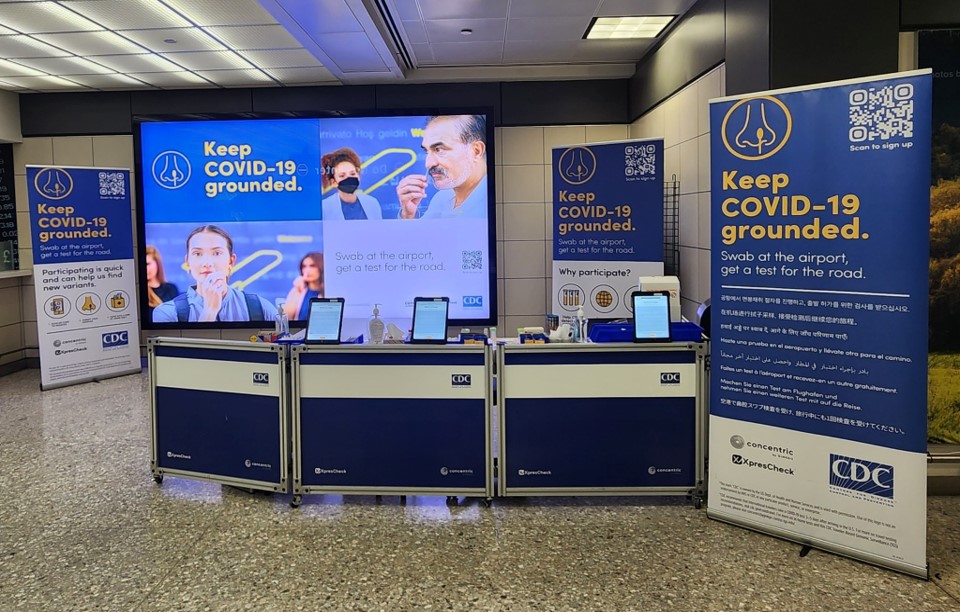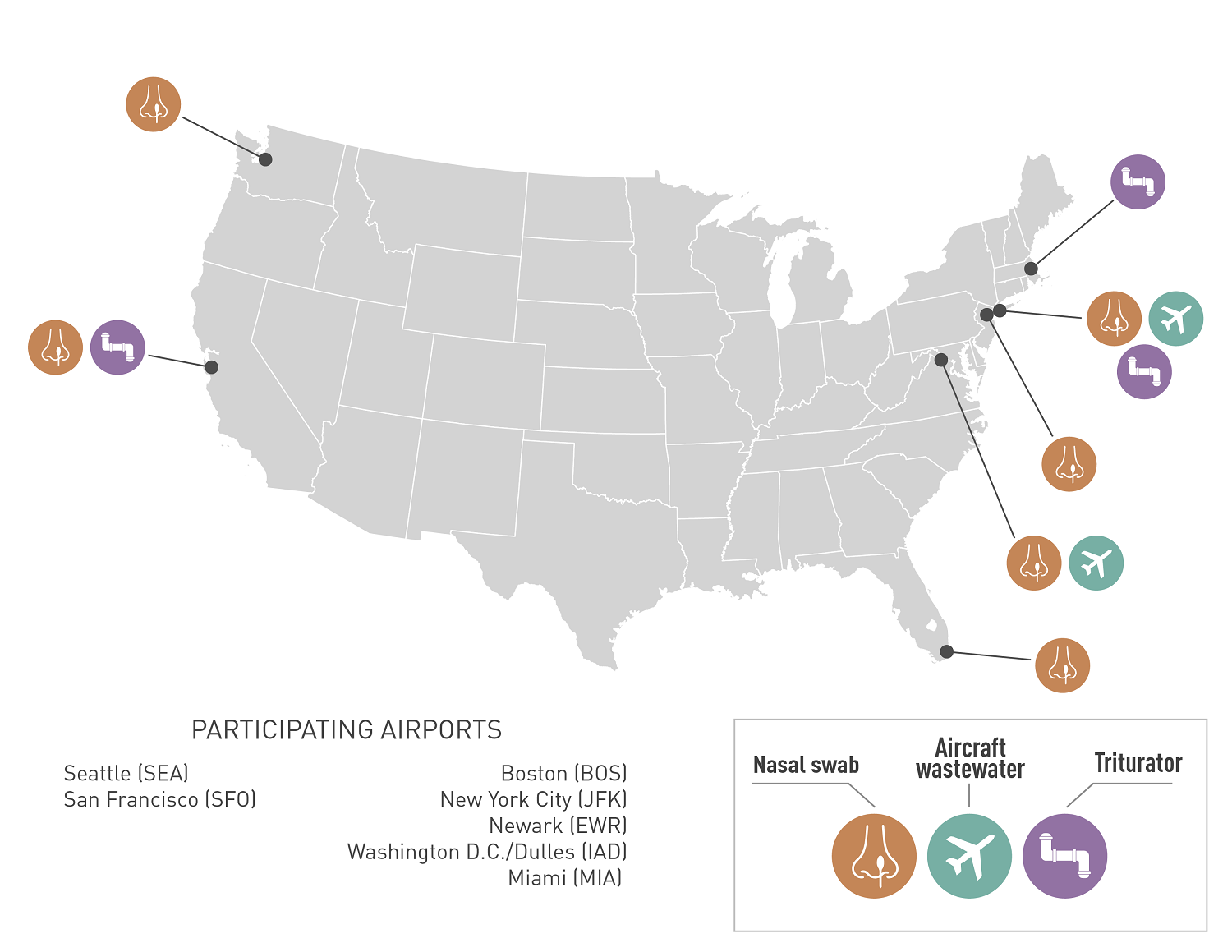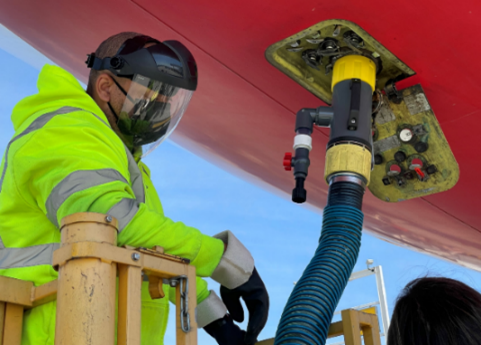Traveler-based Genomic Surveillance for Early Detection of New SARS-CoV-2 Variants
What’s New in TGS: In spring 2024, CDC is expanding the TGS nasal sampling program to two new airports—Miami International Airport and Chicago O’Hare International Airport.
During the 2023–2024 fall/winter respiratory season, TGS conducted a multipathogen nasal sampling pilot, which tested for Flu A/B, RSV, SARS-CoV-2, and other respiratory pathogens.
The Traveler-based Genomic Surveillance program (TGS), led by CDC’s Travelers’ Health Branch, is a public-private partnership that plays an important role in U.S. national biosecurity through its two major goals:
- early detection of new SARS-CoV-2 variants and other pathogens and
- filling in gaps in global biosurveillance.
U.S. airports are visited by more than 1 billion travelers each year.
Travelers are an important population to consider when tracking new and emerging infectious diseases because they move from place to place quickly and can spread pathogens across borders.
Strategic biosurveillance at airports enables timely detection of SARS-CoV-2 variants and other pathogens of public health importance.

TGS testing station located at D.C.’s Dulles International Airport.
-
question icon
Provides an early warning system to detect emerging infectious threats in near real time.
TGS was among the first to detect multiple Omicron variants up to 6 weeks before they were reported elsewhere in the United States. -
question icon
Quickly provides information to public health authorities and samples to US federal laboratories, helping to control disease outbreaks before they cause widespread impact.
An MMWR Notes from the Field article described TGS’s use of genomic sequencing to track the emergence of new and potentially significant SARS-CoV-2 variants like BA.2.86. -
question icon
Fills gaps in global surveillance when testing and sequencing data are not available.
TGS enrolls ~300,000 travelers per year from over 135 countries from all regions of the world. -
question icon
Prevents the spread of communicable diseases, helping to avoid the need for border interventions and disruptions to travel and trade.
During the December 2022 COVID-19 surge in China, TGS expanded rapidly to additional airports to cover over 250 flights from China and surrounding transportation hubs to quickly gather samples and provide information on variants circulating in China.
How it Works

US map of airports in the TGS program. Nasal swab only: Los Angeles, Miami, Newark, Seattle; triturator only: Boston; nasal swab + triturator: San Francisco; nasal swab + wastewater: NYC (JFK), Washington, DC (IAD); nasal swab coming soon: Chicago (ORD)
The traveler sampling program
Individual samples collected from participating travelers provide the most granular and reliable data for detecting SARS- CoV-2 variants and other pathogens. All traveler samples are collected voluntarily, and participation is anonymous.
Participants answer a short survey, which provides a rich metadata to accompany these samples and inform public health decision making. Nasal samples can be transferred to CDC laboratories for further testing.
After a successful proof-of-concept project in September 2021, the program expanded and currently operates at eight major US international airports.
- International travelers arriving at participating airports volunteer to self-collect nasal swab samples.
- Samples are shipped to a laboratory network for SARS-CoV-2 reverse transcriptase polymerase chain reaction (RT-PCR) testing.
- Positive samples undergo whole genome sequencing to determine variants.
- Select TGS samples are shared with CDC’s laboratory where they undergo viral characterization which can provide information about a new variant’s transmissibility, virulence, and response to current treatments or vaccines.
Airplane wastewater sampling program

Collecting wastewater from an airplane for TGS
Wastewater testing is a rapidly emerging science that can help detect outbreaks and pandemics. Community-level wastewater programs have demonstrated success in the detection of SARS-CoV-2 and other pathogens. Airplane wastewater surveillance is an effective and low-cost tool to monitor pathogens that are circulating globally and detect them early before they spread into communities. Wastewater surveillance has the added benefit of not requiring direct involvement/participation from travelers to obtain samples.
Since August 2022, CDC has conducted airplane wastewater sampling. This airplane wastewater program is currently expanding from a pilot phase to broader implementation.
- Wastewater is collected using a custom-made collection device.
- Wastewater samples are shipped to the laboratory for RT-PCR testing.
- Positive samples undergo whole genome sequencing to determine variants.
Airport triturator drain sampling program
Wastewater samples are collected at San Francisco and Boston airports using an automated sampler device at the airport triturator. The triturator is a consolidation point, which captures wastewater samples from multiple flights and does not include airport terminal waste.
The Traveler-based Genomic Surveillance program is a model of pathogen detection that can be used as an early warning system for the detection of many pathogens beyond SARS-CoV-2. Future work includes:
- Expanding to test for multiple pathogens in both the traveler and wastewater programs.
- Creating partnerships to develop a global network for aircraft wastewater surveillance.
- Enhancing surveillance capacity for global mass gathering/migration events.
Contact us: Travel Health Public Inquiries (CDC) travelhealthpi@cdc.gov